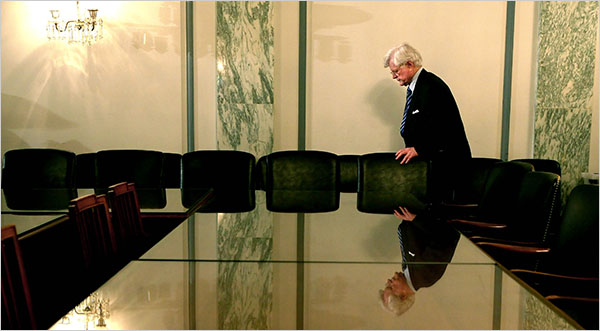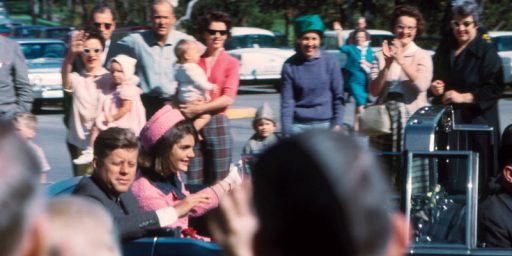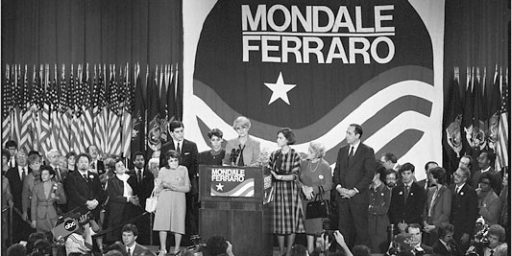Ferraro and Obama Revisited
That Geraldine Ferraro has resigned her position with the Clinton campaign over the seemingly innocuous assertion that Barack Obama benefits from being black and that Hillary Clinton has apologized to black journalists over the incident is not surprising. Whatever the merits of the remarks, race is a sufficiently hot button in American public life that prudence generally dictates silence. As Dave Schuler put it on OTB Radio last night, it’s a Reverse Voltaire: I may agree with what you have to say but will beat you to death for saying it.
Before putting the incident behind us, though, I would like to address posts by two my favorite left-of-center bloggers.
Kevin Drum observes that,
Implicit in Ferraro’s statement is the idea that if Obama were a charismatic young white guy, there’s no way he’d be getting any attention. And that’s just plain crackers. Charismatic young John F. Kennedy won the presidency in 1960. His brother, charismatic young Robert F. Kennedy, attracted huge support in 1968 and might have become president as well if he hadn’t been assassinated. Charismatic young Gary Hart nearly stole the 1984 Democratic nomination from Walter Mondale. And charismatic young Bill Clinton won the presidency in 1992.
But John Kennedy was a war hero and Pulitizer Prize-winning author with a dozen years experience in Congress. Robert Kennedy was, well, the brother of a martyred young president. Gary Hart had nine years in the Senate in 1984 and didn’t steal the nomination from Mondale, an awful candidate. Bill Clinton had been governor of Arkansas for twelve years and president of the National Governor’s Association.
RFK, then, is the only one of the examples who are even close to Obama in lack of experience. And, surely, the statement that, “If RFK weren’t the brother of a slain president, he would not be in this position” would not have created a scandal and forced resignation of a prominent party elder.
Ezra Klein goes existential on us:
But in a weird way, there’s much less to this comment than meets the eye. After all, Obama is not a woman, nor a white man. He’s who he is. To say that if he were different, things would be different is to say nothing at all. As a white woman, maybe he would have led a military coup and established himself dictator. Who knows!? Hell, if he were a slightly less inspiring speaker, or had an off-night at the 2004 Democratic National Convention, he wouldn’t be in this position either. Similarly, if Hillary Clinton were a black man, it’s unlikely that she would have been a national political figure for the past 15 years, as it’s unlikely that she would have married another man from Arkansas, and unlikely that the country would have put an interracial, same sex couple in the White House. But so what? This is an election, not Marvel’s “What If?” series.
On one level, this is right. To the extent Obama’s skin color is an advantage, it’s barely more noteworthy than the fact that having a full head of hair, a pleasant speaking voice, and being tall have helped him.
But counterfactuals can be an excellent way of unraveling things and getting to the truth. Two obvious examples:
- (Said in 2000:) “Would we seriously be considering George W. Bush as our next president if he weren’t the son of a president?”
- “Would we seriously be considering Hillary Clinton as our next president if she weren’t the wife of a president?”
Of course, Bush was the son of a president and Clinton the wife of one. But isn’t it valuable to carry out the thought experiment? It’s a very useful way of thinking about whether candidates are qualified.






James,
How can you separate the specific from the general here?
I mean, if Ferraro had said, “Being black is an advantage to a politician,” we would laugh and point out the paucity of black governors, senators, and representatives in white CDs.
But, as you seem to find her comment reasonable, you must see some difference, in that, in the specific case of Obama, he has benefited, even though, in general, it is not an advantage.
I’m not trying to put words in your mouth, or back you into some logical trap, but I just don’t see it.
“a charismatic young white guy, there’s no way he’d be getting any attention. And that’s just plain crackers.”
Can he SAY that?
Let’s try some of the reports on Obama and imagine them being written about a charasmatic white guy (or gal).
Analyst Daniel Schorr observes the ascendance of Barack Obama as a presidential candidate and wonders whether the U.S. is entering a new, “post-racial” political era.
Though I remain ever suspicious and critical of mainstream electoral politics in the United States, there is a significant part of me that really wants to believe in Barack Obama. His eloquence and message of change and hope are terribly seductive compared to the stale and petty politics of Hillary Clinton (Plagiarism!? Are you kidding me?), even though I know better than to be sucked into such fantasies. And really, it means a hell of lot to me that we could really have a black president. I never really expected that it might happen so soon, like a whole lot of other black folks who turned to Obama in droves when it appeared that white people might actually give him a shot.
At first glance, the black-white response to Mr. Obama appears to represent breathtaking progress toward the day when candidates and voters are able to get beyond race. But to say the least, it is very odd that black voters are split over Mr. Obama’s strong and realistic effort to reach where no black candidate has gone before. Their reaction looks less like post-racial political idealism than the latest in self-defeating black politics.
The point should be obvious. Obama’s race is at least part of what got him here. That does not mean that he has no other qualities or capabilities to be president. But ignoring it is like ignoring who Hillary is married to or how long McCain has been in the senate. They are all things about how he got here.
Now given that he has 0 time in executive position (e.g. Govenor) and 3 years on the national stage, I think it is reasonable for people to look and say why is he getting this shot. Charasmatic and well spoken politicians are not exactly thin on the ground. It’s part of getting there. Some are better than others, but that is not the only price to entry. 40 years ago an Obama couldn’t have gotten this far no matter what his charisma. 20 years ago a charasmatic black candidate was taken seriously but failed to get the nomination. Today Obama is the front runner. So why is it so hard to acknowledge the role race has played in Obama getting to where he is?
James,
The problem with your ending point is where is the obvious advantage. Of course being the son of a President is an advantage. There are about a 1000+ examples of a child of the head of state assuming his position. Even in the case of being a spouse of a head of state, there are numerous examples such as in India and Argentina. Where is there any evidence at all that being black is some obvious advantage except in a majority-black country? There is just no factual basis for these statements.
The outrage, I think, comes from the appearance of a pattern in the Clinton campaign, from Bill Shaheen, to Bill Clinton several times, to several staffers, to Geraldine Ferraro, that seems to want the American voting public to be absolutely certain it knows that Senator Obama has black blood in him. “If it walks like a duck…”
Generally speaking, being black is, at best, a non-advantage and, more likely, a disadvantage. At the same time, though, there is I think a deep desire on the part of many whites to find a non-threatening black guy for whom to vote. Or, just generally, hold up as role models.
Colin Powell has a much more impressive resume than Obama and was a dream candidate for president for a while. But no other JCS Chairman in recent years has garnered that kind of sentiment. I’d argue race was a primary reason Powell did.
There are several less accomplished black politicians — Michael Steele, J.C. Watt, Herman Kahn — who are rock stars at CPAC and other Republican gatherings.
In a different arena, there’s the Tiger Woods phenomenon. The fact that he’s “black” (or “cablinasian,” or whatever) is a big factor in the hoopla. Granted, he’s probably the best golfer in the history of the planet. But he was a superstar that radically increased casual interest in golf before he’d teed off in a professional tournament.
Chris Rock had a bit years ago about people being surprised that Colin Powell was “articulate.” That, as he pointed out, is incredibly racist. We would damned well expect someone in his position to be able to speak. Regardless, that’s a visceral reaction people have.
Being a black man named “Barack Obama” is a disadvantage. But once he crossed a certain threshold of credibility and comfortability, he benefited greatly from the soft bigotry of low expectations. Suddenly, he was the Great Black Hope.
James, you hit it on the head. Maybe Ferraro should consult you in the future.
Obama being black is a minus and a plus. A minus in that the U.S. is still trying to shake off the centuries of discrimination. But it’s a plus in that there are significant numbers of people wanting so much to rise above the nation’s history. It’s a yearning for Martin Luther King’s dream.
Maybe that’s what Ferraro tried to express, but it’s a bundle of complicated concepts that are sure to be misconstrued by way of a politician’s sound bite.
“several less accomplished black politicians — Michael Steele, J.C. Watt, Herman Kahn — who are rock stars at CPAC and other Republican gatherings.”
It is not wrong to stress that Obama’s blackness will help him as the Black vote in the democratic primary is extremely important. From what I have seen 90 percent of Blacks are voting for Obama. I do not think it is just because he is an eloquent speaker.
Less accomplished black politicians. I do not know of black politician Herman Kahn, but I have heard of Michael Steel and J.C. Watts. Both whom have what I would consider reasonable accomplishments, J.C. Watts, more so than Michael Steel.
Michael Steele – Lt Governor of Maryland in a predominantly Democratic state.
J.C. Watts, Member of Congress with service on several important committees, Pastor, University and professional football player,
J.C. Watts – As a Member of Congress representing the fourth district of Oklahoma, J.C. served for eight years on the House Armed Services Committee. He authored legislation to create, and then he later served on, the House Select Committee on Homeland Security. He also served on the House Transportation and Infrastructure Committee, as well as the House Banking Committee. He led two congressional trade missions to Africa. He co-authored the American Community Renewal and New Markets Act, which President Clinton signed into law in 2000. He was the author of President Bush’s faith based initiative, the Community Solutions Act of 2001. He also developed legislation with Congressman John Lewis to establish a Smithsonian museum of African American history.
After returning to Oklahoma, Watts served as a youth minister at Sunnylane Baptist Church in Del City, Oklahoma from January 1987 until December 1994, when he then became associate pastor. In 1990 he was elected to the Oklahoma State Corporation Commission and became chairman before running for Congress in 1994.